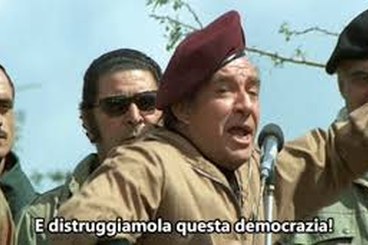False memories of a golpe. Real and imagined violence between italy and Argentina.
With Francesco Mazzucchelli. In the framework of June activities of Project SPEME.

-
Date: 23 JUNE 2023 from 15:00 to 17:00
-
Event location: Sala Rossa, Centro Umberto Eco, Via Marsala 26, Bologna
Abstract
The seventies were the decade of coups d'état: from Greece to South America (Chile, Argentina, Brazil, Uruguay, etc.), many democratically elected governments were overthrown by force and replaced by military dictatorships, sometimes covertly supported by the United States and CIA as part of the so-called “Operation Condor”, to contain socialist and communist movements. On the contrary, there was never a coup d'état in Italy, although the specter of a violent overthrow of the democratic system was always very present in those years. Indeed, the concrete fear of a coup d'état has materialized before the Italian public opinion many times. From the leaked news of the so-called "Piano Solo" in the late 1960s, to the judicial investigation of the coup attempt that became known as the “Golpe Borghese”, to the “strategy of tension”, and then the P2, and the alleged negotiations between the state and the mafia, the “ghost of the coup” has always occupied its own specific narrative role in the Italian political scene, changing according to the period.
Thus, while Pinochet deposed Allende's Popular Unity government and Videla's “military junta” violently seized power in Argentina, in the same period, Italy was marked by extreme phenomena of political violence (the “Years of Lead”) in which the “potential coup” had political repercussions.
In my paper I would like to propose a "semiotic experiment" of counterfactual history, resulting from my participation in a European project (SPEME, https://www.speme.eu), focused on a comparison between the different forms of symbolic reprocessing of some collective traumas of political violence in Europe, Argentina and Colombia. Aware of the great differences between the histories of the two countries, and without pretending to propose a historiographical analysis, I will try to read the images and the collective memory of the “missed coup” in Italy through the mirror of the dramatic Argentine dictatorship experience. The current Argentine "politics of memory" that aims to shape a common narrative and memory representation of the years of the guerra sucia (the "dirty war" in which the Argentine military government repressed, tortured and killed thousands of dissidents) will be compared to the literary (and especially "cinematic") imagination through which this “potential” coup d'état in Italy was conceived, especially in films and documentaries. By applying some concepts of semiotic theory, such as Umberto Eco's notion of "possible world", I will try to investigate the narrative role of the “coup trope” in Italian imagery, focusing especially the differences in the narrative strategies between some Italian films from the Seventies and more recent documentaries on the topic of the “almost coup”.
Bio
Francesco Mazzucchelli is Associate Professor of Semiotics at the University of Bologna. He coordinates TraMe, Research Center for the Semiotic Study of Memory and is Vice-President of AISS, Italian Association for Semiotic Studies. His current research deals with on the narrative and discursive dimensions of cultural heritage and the processes of construction/transmission of collective memory from a semiotic perspective, with a particular focus on difficult/dissonant heritage (in Italy but not only).
https://www.unibo.it/sitoweb/francesco.mazzucchelli/en